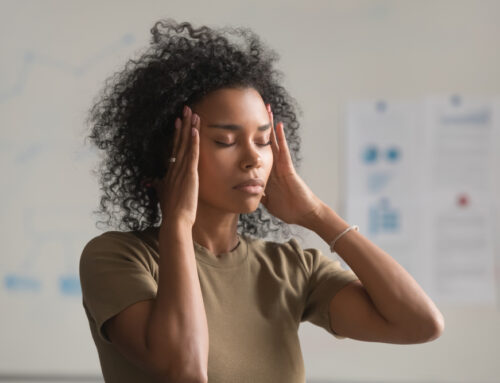Hormones and mental health are closely linked, with hormonal imbalances often influencing mood, anxiety, and overall emotional well-being. Fluctuations in hormones like estrogen and progesterone can disrupt neurotransmitter function, leading to symptoms such as anxiety, depression, and mood swings, especially during menstrual cycles, pregnancy, menopause, or other hormonal transitions. A naturopathic holistic approach that includes assessing and addressing hormonal health can significantly impact mental health, offering more sustainable improvements by targeting the root causes of hormonal disruptions. This approach often involves dietary changes, lifestyle adjustments, and natural therapies that support hormone balance, helping individuals manage mood and anxiety more effectively.
How Hormone Changes Can Cause Anxiety and Depression During the Menstrual Cycle
Hormones and moods during the menstrual cycle can greatly influence mental health, leading to conditions like PMS (premenstrual syndrome), which includes both physical and psychological symptoms such as low mood, anxiety, and mood swings. These symptoms typically occur two weeks before menstrual bleeding, affecting daily functioning. PMDD (premenstrual dysphoric disorder) is a more severe form, involving intense mood and physical symptoms. (1) Hormones and anxiety are also prevalent in peri- and post-menopausal women (2), highlighting how shifts in hormones, such as a decline in estrogen or a rise in progesterone, can affect neurotransmitters like serotonin, GABA, and dopamine (3), ultimately influencing mood and mental health. Understanding hormone balance symptoms is key to managing these changes effectively.
What is the Connection Between Hormones and Mental Health?
A good way to determine whether hormones are affecting your mood symptoms is to track your symptoms along with your cycle. Hormones and moods during the menstrual cycle can significantly impact how you feel, and tracking your symptoms alongside your cycle can help identify patterns. There are many free apps out there that make this very easy. Suppose you are undergoing a hormonal transition, for example, pregnancy, postpartum, or perimenopause. In that case, it may be worthwhile to work with a healthcare practitioner who can help you determine whether your hormones are having an effect on your psychotherapy health, like contributing to anxiety or other mood disturbances, and guide you towards proper care. The importance of a proper diagnosis cannot be stressed enough to ensure that you get the proper care and treatment that you need (4).
How Balancing Hormones Helps Manage Anxiety and Stress
Hormone balance is achieved through a comprehensive approach that may include dietary and lifestyle changes as well as the addition of nutrients, herbs, or bioidentical hormones on an individualized basis. As a baseline, there are some general lifestyle practices that we know have a positive effect on our hormonal health and mood:
- Aim for 7-8 hours of sleep per night to ensure your circadian rhythm is optimized. This is the master clock that is set in the brain from signals of light and dark in your environment, and it has an effect on hormonal and metabolic homeostasis in the body (5). The main hormones here that we want in balance are melatonin and cortisol, which then impact many of our other hormones. Some tips for a good night’s sleep include sleeping in a dark, cool room, and limiting your exposure to screens for at least 90 minutes before bed.
- Manage the stress in your life by setting aside 10 minutes per day for deep rest or relaxation. We know that stress affects our hormones and if we do not take action to manage the stress in our lives, it can lead to imbalances in our sex hormones like estrogen and progesterone, thyroid function, insulin sensitivity, etc. (6). It doesn’t have to be complicated or take too much time, but even spending 10 minutes going for a walk outside, having a hot bath, breathing deep into your belly, or following a guided meditation can help you to reduce the effects of daily stress on your body.
Nutrients and Herbs to Support Hormonal Imbalance and Mood
There are many great evidence-based nutrients and herbs that can help support hormonal
balance and mood. I always recommend working with a practitioner to determine which supplements will be most effective and safe for your unique health condition. Some of these include vitamin D, B6, calcium, magnesium, Vitex, and Black cohosh (1).
At Innate Wellness, we explore the important connection between hormones and mental health, understanding that hormonal imbalances can impact mood and emotions. Our holistic approach addresses lifestyle and dietary changes while also providing psychotherapy and counselling services to support individuals dealing with the emotional challenges related to hormonal fluctuations. If you’re experiencing mood changes linked to hormonal issues, contact us today to learn how we can assist you in better understanding the connection between hormones and mental health.
References:
- Rapkin A. A review of treatment of premenstrual syndrome and premenstrual dysphoric disorder. Psychoneuroendocrinology. 2003 Aug;28 Suppl 3:39–53.
- Gracia CR, Freeman EW. Onset of the Menopause Transition: The Earliest Signs and Symptoms. Obstet Gynecol Clin North Am. 2018 Dec;45(4):585–97.
- Hofmeister S, Bodden S. Premenstrual Syndrome and Premenstrual Dysphoric Disorder. Am Fam Physician. 2016 Aug 1;94(3):236–40.
- Hantsoo L, Epperson CN. Anxiety Disorders Among Women: A Female Lifespan Approach. Focus Am Psychiatr Publ. 2017;15(2):162–72.
- Gnocchi D, Bruscalupi G. Circadian Rhythms and Hormonal Homeostasis: Pathophysiological Implications. Biology [Internet]. 2017 Feb 4 [cited 2020 Jan 16];6(1). Available from: https://www.ncbi.nlm.nih.gov/pmc/articles/PMC5372003/
- Ranabir S, Reetu K. Stress and hormones. Indian J Endocrinol Metab. 2011;15(1):18–22.






